Episodes
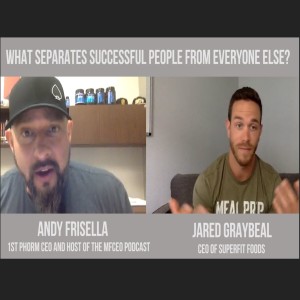
Thursday Jul 11, 2019
#17 What Separates Successful People From Everyone Else with Andy Frisella
Thursday Jul 11, 2019
Thursday Jul 11, 2019
In this episode, I interview Andy Frisella, a highly successful entrepreneur, top-ranked podcast host, and speaker who leads the #100to0 movement. Andy is the founder of Supplement Superstores, the Arete Syndicate and one of the largest supplement companies in the world, 1st Phorm. It's safe to say he knows his stuff!

Thursday Jun 13, 2019
#16 Time or Money: Choose One
Thursday Jun 13, 2019
Thursday Jun 13, 2019
TIME OR MONEY: Choose one
Do you know what breaks my heart? People not living up to their potential, and in turn, being unhappy.
As I mentor friends, work with e3 clients and just browse social media – I see one common theme: most people aren’t reaching their goals for 2 reasons:
Not enough time, and/ or not enough money.
That’s because they have been conditioned to believe they have specific predisposed capacity, and that subconsciously we have to choose free time or a surplus of money. Most people that have money are always “too busy” to spend time with friends or family. Most people that are consistently social are often times complaining about being broke.
Unfortunately, at least in America, we are seeing people dramatically lean to one side or the other. We are seeing the largest income gap since the 1920’s, and worse, the largest percentage of people struggling with mental disorders like depression and anxiety.
So what I want to talk about today is: By learning to manage these things better, we can learn to make more money, take back our time, and live happier healthier lives.
What I’m about to say is not to boast, but to give perspective. I personally run 2 businesses, one full time and one part-time. I am in college part time, I work out 6 days a week. I have 3-4 social evenings per week. I practice hobbies such as boxing, painting, shooting guns, and even traveling regularly. I read and write every day, and I also take care of my pup. I do all that and get an average of 7 hours of sleep per night, and I know - that there is still more in me…
A preponderance of evidence shows that the feeling of having enough time — “time affluence” — is now at a record low in the United States. When a survey was done of 2.5 million Americans by the Gallup Organization, they found that 80% of respondents did not have the time to do all they wanted to each day. This situation is so severe it could even be described as a “famine” — a collective cultural failure to effectively manage our most precious resource, time.
Time poverty exists across all economic strata, and its effects are profound. Research shows that those who feel time-poor experience lower levels of happiness and higher levels of anxiety, depression, and stress. They experience less joy. They laugh less. They exercise less and are less healthy. Their productivity at work is diminished. They are more likely to get divorced. And in an analysis of the Gallup survey data, researchers found that time stress had a stronger negative effect on happiness than being unemployed did.
On a broader level, time poverty directly accounts for billions of dollars in productivity costs to companies each year, and secondary costs multiply that number many times over. Public health officials rank it as one of the top contributors to rising obesity. Researchers put the health care costs of time stress at $48 billion a year.
- LOOK AT TIME LIKE WE LOOK AT MONEY
Why?
Studies showed that people who prioritize their time are more likely to pursue and work in careers they loved
Example: every time you go to spend $5 on a coffee, or $100 on shoes, you ask "is it worth it", and you justify the money spent or you decide not to spend it.
What do I do?
Create a time budget.
How?
Draw out 168 hours…
- PLAN TO BE SPONTANEOUS:
Why?
Because of TIME SLACK - Slack is the perceived surplus of a given resource available to complete a focal task. Our research shows that, in general, people expect slack for time to be greater in the future than in the present. This expectation of growth of slack in the future is more pronounced for time than for money.
What do I do?
Plan your future time. When it comes to leisure time, the data suggests that people have a natural bias toward spontaneity: We don’t want to feel our free time is too scheduled. So we do things like leaving weekends up to chance — and then end up wasting much of them. But we’re actually happier if we make plans and don’t passively fritter away time.
How?
Communicate with your friends, family and/or spouse more about your flex time. See when they are free so you can all enjoy each other together more.
- PLAN YOUR MEALS:
Why?
When Romain Cadario, a professor at IÉSEG School of Management in Paris, recently surveyed 12,000 French and American adults about their dining habits, he found that on average, the French spent significantly more time eating. In turn, they had a much more positive association with food. Americans spent more time choosing their meals than actually enjoying them.
What do I do?
Plan your meals like you plan your outfits.
How?
Prep and cook in advance, use a meal prep company, or simply think about your lunch tomorrow in advance so when lunch time comes around – you know where you are going.
- IDENTIFY WHAT IS WORTH REALLY SAVING MONEY OR TIME ON
Why?
Sometimes our “bargains” are actually costing us more time AND money.
For example:
- a 10 hour flight vs a 6 hour flight and saving $50
- driving further for cheaper gas
- going from store to store for a bargain on the same shirt to save $10
What do I do?
Always weigh the pros and cons of purchasing decisions.
How?
Learn to create more inner dialogue. You will want to do this quickly (for purchases like gas) and know when to spend time on it (like airplane tickets).

Thursday May 02, 2019
#15 Leading Women in the Workplace Featuring Tammy Heermann
Thursday May 02, 2019
Thursday May 02, 2019
In this episode, Jared sits down with speaker, leadership development expert, and soon to be author, Tammy Heermann to unpack leadership in the workplace.
Tammy is specifically sought out by global Fortune 500 companies for her expertise in gender diversity and programs that accelerate women’s advancement. While having a significant impact in the C-Suite, she is happiest when pushing up-and-coming leaders to break through organizational and self-imposed barriers to reach their potential. She creates trust by sharing stories of her own journey from Senior Consultant to Senior Vice-President. Through alternating moments of humor and heartache, people walk away from their experiences with Tammy transformed.
Tammy helps individuals and organizations get serious about leadership. For over 20 years she has developed and facilitated pioneering and multiple award-winning programs, beginning from within Human Resources and ultimately as the head of the Leadership Development practice at a Global Consulting firm. She has helped change thousands of people’s mindsets around what it takes to lead, both self and others.
Tammy sits on the Women’s Leadership Advisory Committee for Women in Communications and Technology where she acts as a mentor and helps aspiring C-Suite leaders advance through sponsorship. She is a graduate of the London School of Economics where she earned a Master of Science degree for her studies on change management and global human resource strategies. She also holds an Honours Bachelor of Commerce degree from the University of Saskatchewan.
To learn more about Tammy, visit her website at www.tammyheermann.com or follow her on Instagram @tammy_heermann

Thursday Apr 11, 2019
#14 The 5 Disciplines of Leadership That I Learned the Hard Way
Thursday Apr 11, 2019
Thursday Apr 11, 2019
Then 5 disciplines of leadership that got me to where I am - that I learned the hard way:
1.Time Management
When you are on house arrest, you have to show up to your CO every Sunday morning, and present a document that literally details the next 168 hours.
Quick tip: create a time budget
- Responsibility
Be a person that does what you say you are going to do. Not just for others, but for yourself. How many of us let others down by being “that guy”, or “that girl”?
More importantly, how many times have you told you that you would do X, Y and X this year… only to let yourself down time and time again.
In my situation, you get to a point where you realize that no one is going to do it for you. And growing up, being someone that was well aware of my potential, I knew that if I didn’t do it for myself, it wasn’t getting done. And I could either choose to sleep on a deflating air mattress every night or do what it took to make something of myself.
Quick tip: write everything down on a running to-do list
Do what you say you’re going to do.
- Driven by learning
Leaders are learners.
Quick tip: commit to learning something new every day, week, month and quarter.
- Patient urgency
Having this relative and dual perspective of time, you can live in both the now and the future. Patient urgency is the combination of foresight to prepare for a big idea, willingness to wait for the right market conditions, and agility to act straight away when conditions ripen.
Like Blockbuster, who failed to see the writing on the well and act in urgency. Or WebVan.com?
Quick tip: Have all your dreams and goals written down and refer to them as often as you can. By doing this, you will have a much better idea as time goes on as to which idea or goal to act on. Also, by being better with time management, responsibility and learning more, you will naturally be prepared for these opportunities.
- Faith
Yes, I mean faith in God. But even more so, faith in yourself. Faith that no matter who you are today, who you see in the mirror, what people say about you or what you have or haven’t accomplished so far, especially compared to what you had planned by now, that you are capable of far more than you can think or imagine. I was once the kid in school that was so poor that I drew the Nike sign on my hand-me-down socks that I got made fun of. I was the kid that didn’t make the little league football team because I kept showing up to practice with no pads. I was the kid that, in 7th grade, my teacher told me, in front of everyone, that my homework was to look up the definition of “miserable failure”, because that’s what he told me I’d be.
You have to believe in yourself before anyone else will. And by taking a small step every day in the direction of these 5 disciplines, you can change your life and the trajectory of your future.

Thursday Mar 14, 2019
#13 4 Traits of High Performers
Thursday Mar 14, 2019
Thursday Mar 14, 2019
4 Traits of High Performers
By Jared Graybeal
- They have a VISION
How do you establish a vision?
- What is my Mission?
- What are my Values?
- They have a “TIME BUDGET”
How do you create a time budget?
- Schedule everything that’s consistent in your life. Put it on your calendar.
- Hobbies (Bible Study)
- Regular Meetings
- Healthy habits (gym)
- School
- Work
- Create a running to-do list
- Create a “to-don’t” list (and quit wasting your time!!)
- They are HEALTHY
We all know this is important, but people rarely practice it. How can you be healthy?
- Eat healthily
- Find healthy food or a diet that works for you (or a meal prep company!)
- Exercise regularly
- Find an activity you like! It doesn’t have to be in the gym.
- Sleep enough
- This is more important than most people think. Get no less than 6 hours a night, but ideally 7-8 hours per night.
- They are HUMBLE
How can we maintain or gain humility?
- Ask more questions
- Fail forward and fast
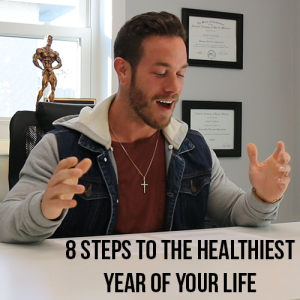
Friday Feb 15, 2019
#12 8 Steps to the Healthiest Year of Your Life
Friday Feb 15, 2019
Friday Feb 15, 2019
8 Steps to the Healthiest Year of Your Life
An 8 minute read by Jared Graybeal
As we look back at each year, some of us are filled with encouragement and joy for everything we were able to get done and experience, but some are filled with regret for looking at how fast the year went by without accomplishing their goals or getting any further in life. I’m sure we have all felt one way or the other at one point. Some would say that is a part of life, and while we can’t control a lot of what happens to us, there is a lot that we can control. Like our habits. We have all heard the famous saying, “it’s not how you start, it’s how you finish”. Although that may be true in most cases, I am a firm believer that HOW we start, will ultimately determine how we finish. I think if you get in the routine of having enough “good days”, you will be able to look back and confidently say you’ve had a good year. It’s time to take a step in the right direction.
I personally have 15 things that I like to do every day, and since some of them are personal and individual to my life, I have pulled the 8 that I think can apply to everyone. I have taken the time to describe them as well as the rhyme and reason behind why I do it!
What’s great about locking down these 8 steps to a better year is that after enough of these ‘days’, they eventually add up, and lead into living a better life. And that is ultimately the end goal and what I want for everyone.
5 of these should or can be done prior to going to work or starting your day, whatever that looks like for you.
1 and 2 take 15 minutes before you go to sleep.
3 – 6 takes 45 minutes before your day starts.
7 takes 30-60 minutes and is only needed 3-5 times a week.
8 can take 5 seconds
Total: 1.5 to 2 hours
Step 1: Spend 15 – 20 minutes reading before going to sleep.
- According to the National Sleep Foundation, a relaxing reading ritual can prepare your body for sleep and help your mind separate your sleep time from the stresses of daily living. A winding-down ritual can help people fall asleep faster and enjoy a higher quality of sleep throughout the night.
- Reading before bed can help to lower the body’s cortisol levels by reducing stress. The result? A body with lower levels of cortisol is more likely to sleep soundly and thus cope with the following day’s stressors more calmly.
- General practitioners in Britain have begun prescribing book reading to patients who suffer from mild to moderate depression and anxiety, and many of these patients report an alleviation of their symptoms as a result.
Step 2: Review your short-term and long-term goals.
- By looking at these every day, even just for a minute, it will continually help you navigate proper decision making. You will do a better job of saying “no” to opportunities that aren’t conducive to your goals, which will give you more time and energy to say “yes” to the things that do.
- I like to do this before bed, but do whatever time works best for you.
Step 3: Upon waking, chug a bottle of (room temperature) water.
- When you’re not properly hydrated, your brain operates on less fuel and you can experience fatigue or mood fluctuations, which is something I’m sure we would all LOVE to avoid.
- Getting fluids right when you wake up will help your body start flushing out harmful toxins right away. According to Kenneth Ellner, an Atlanta based dermatologist, “Your kidneys do an amazing job of cleansing and ridding your body of toxins as long as your intake of fluids is adequate. “
- A 2003 study from the Journal of Clinical Endocrinology and Metabolism found that drinking two cups (16 oz., which is a typical bottle) of water upon waking increased metabolism by 30% after 30–40 minutes. Not only does water keep your body lean it also helps with keeping the flow of nutrients and helps get rid of free radicals.
Step 4: Prayer (some may call this Meditation).
- The first half of my prayer is gratitude or thankfulness. By spending time acknowledging every single thing that you have been given in life, you will immediately be in a better mood and be able to accomplish the things you set forth that day and tackle any challenges that may pose themselves much better. According to Robert Emmons Ph.D., regular grateful thinking can increase happiness by as much as 25%. I make a point to recognize and thank God for everything that comes to mind, both big and small. Like the sun rising again, my physical capabilities, my senses, my friends, family, home, vehicle, clothes, talents, career, etc. (sometimes this can take a while – but that’s a good thing!)
“Of all the attitudes we can acquire, surely the attitude of gratitude is the most important and by far the most life-changing.” – Zig Ziglar
- The second half consists of mentally mapping out my day and speaking life into (or self-affirming) all of the goals I have set and the things I plan to accomplish that day. Affirmations, or positive thinking, can interrupt your maladaptive neuro-nets. The more you do this, the more those nerve cells that are connected to each other start breaking the long-term relationship with your negative thoughts, literally re-wiring to your new, affirming beliefs. Science calls this neuroplasticity and it is the proof behind how powerful this practice can be.
“Death and life are in the power of the tongue: and they that love it shall eat the fruit thereof” – Proverbs 18:31
Step 5: Eat (a healthy) breakfast.
- This is literally the most important meal of the day. For people like myself, who work in the health and wellness industry (and actually apply what we know), that is a given. But unfortunately, most people neglect this information and forego this meal on a daily.
- Breakfast is a critical meal because it influences practically every dimension of our being during the course of the day, including how we perform physically and mentally. Breakfast immediately raises the body’s energy level and restores the blood glucose level to normal after an overnight fast. It also raises the muscle and liver glycogen stores.
- Studies have shown that children who eat breakfast perform at a higher level in school and are more physically active than those who skip breakfast, ultimately leading to better physical fitness (which is a whole different article in itself). Also, breakfast helps increase the ability to focus and reduces declines in attention and memory over the morning hours.
Step 6: Learn something (relevant to your career and/or passions) for up to 30 minutes.
By spending a bit of time increasing your knowledge of your trade, you will naturally go into work each day an incrementally better, more equipped employee. Doing this every day will eventually and inevitably lead to higher pay, promotions, opportunities, etc.
- The more you know, the more you can help people. No matter what you do for a living, if you want to be successful, you have to consistently focus on how that product or service is benefitting others. By investing a short period of time each morning to learning a little bit more, you will have more opportunities to relay that information to others throughout the day and begin to positively impact the lives around you.
Step 7: Exercise for 30-60 minutes a day for 3-5 days a week.
(If you can) Morning exercise has been shown to improve focus and mental abilities all day long. Not only will you feel awake and have more energy after your workout, but your mind will be ready to take on whatever tasks you have lined up that day.
- No matter what time of the day, when you exercise, your body releases chemicals called endorphins. Endorphins also trigger a positive feeling in the body, similar to that of morphine. It’s ideal to do this first thing in the morning, so you can go into work feeling AWESOME!
- By getting a short work out first thing in the morning, you can increase your EPOC (Excess Post-Exercise Oxygen Consumption), which allows your body to burn more calories at rest throughout the day.
Step 8: Do or say something nice for someone else.
Here are 5 reasons why:
- It promotes positive physiological changes in the brain associated with happiness
- Helping others leads to a more physically active lifestyle
- It distracts us from our own problems
- It improves our self-esteem and competence
- Studies show that older people who give support to others live longer than those who don’t
Examples:
- Buy someone coffee
- Send an encouraging text
- Tell someone you love them
- Give someone a compliment
- Teach someone something (vs showing them)
- Volunteer
- Mentor
I believe that by implementing these 8 steps every day, you’ll immediately begin to experience a better day, have a better year and ultimately, a better life!
Much Love,
Jared Graybeal
CEO – Superfit Foods

Thursday Jan 17, 2019
#11 4 Steps to Navigating Tough Organizational Change
Thursday Jan 17, 2019
Thursday Jan 17, 2019
4 STEPS TO NAVIGATING TOUGH ORGANIZATIONAL CHANGE
By Jared Graybeal
In my professional career, I’ve made a ton of mistakes. Heck, in life I’ve made a ton… and today’s teaching will reflect and help you with decision making in both your personal and professional life.
Today’s teaching focused primarily on “leading through tough organizational change”.
AS LONG AS you lean in and apply what you learn – then this should provide a lot of value for you. Because we know that knowledge is only valuable if we use it…
So let’s dive in… tough organizational change…
Do you have to fire someone? Maybe it’s a family member, good friend or a long-time, now underperforming employee?
Do you need to shut down a portion of your operation and are having a hard time developing strategic communication around that?
Are you a new leader and are dragging your feet on some effective changes you need to make in order to reach your goals?
I can empathize. This year, I’ve had to:
- Fire my brother
- Fire my best friend
- Shut own our original kitchen
- Part ways with my business partner
And these are just a few of the things that, as a company, and as a leader, I have had to navigate through…
Jim Stockdale said:
“You must never confuse faith that you will prevail in the end – which you can never afford to lose – with the discipline to confront the most brutal facts of your current reality, whatever they may be”
- Face the facts and forget your feelings
Especially in the small business sector, or when leading small teams, it is easy to get close to the people around you… as you should.
- Talk to a professional and/or mentor
Never assume that just because you’ve made your decision, that it is always the right one. Seek out a professional in your space, a mentor, or someone who has been in a similar situation
- Prepare
Take practical steps towards making the change:
- Prepare how you will initiate and execute the change.
- Prepare for how this change will affect your organziation
- Prepare how you will communicate the change, and why.
- Execute immediately
Too many people spend time in the waiting stage, hoping for another sign that this is the right decision.
4 QUESTIONS:
- What changes are you pushing off, that you know you need to make, but one of these reasons is holding you back?
- Who do you need to seek out?
- How are you going to prepare?
- When will you execute?
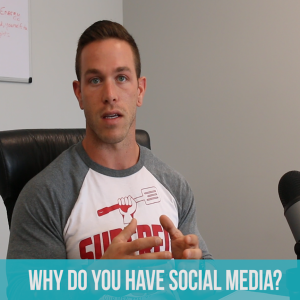
Tuesday Nov 13, 2018
#10 Social Media: Is It Really Necessary?
Tuesday Nov 13, 2018
Tuesday Nov 13, 2018
Man… we spend so much of our time on social media. With life happening all around us, most of us would rather live it through the lens of our phones. Or even worse, so many people get so caught up in watching other people lives through their ‘stories’ and glorified highlight reels that they forget to live their own.
But really, I’m guilty of it too. That’s why I try to be intentional with the time I spend on my phone, on social media more specifically, especially when I’m spending time with friends or working or reading or doing all the things I enjoyed before social media was even a thing.
Granted, both of my businesses and my ability to reach people all over the world with these messages was enabled through platforms like this – but there are a time and a place, and you have to monitor the real “why” behind how much time you spend on here.
Here are 3 things I do that I recommend you do if this message speaks to you:
1. Smartphones track how much time you spend on what now (Instagram, Facebook, texting, calling, etc ) so take a weekly inventory and if there are any red flags, address them and work on them.
2. Do regular social media “fasting”. I’ll take 2-3 days entirely off my personal page every week or two so I can refocus on what’s really important.
3. Ask yourself why you even use this platform. Is it benefiting you realistically? Are you benefiting others? If it’s neither, then there’s really no point.
Life’s wayyyy too short to look back and realize you spent most of it scrolling social media.
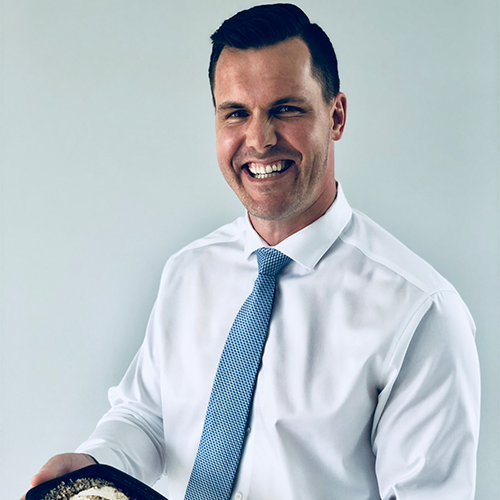
Thursday Aug 23, 2018
#9 What You Need To Know About Chiropractors
Thursday Aug 23, 2018
Thursday Aug 23, 2018
Jared sits down with Dr. Shaun Janse van Rensburg of Southeast Orthopedic Specialists to discuss chiropractic medicine and unpack different methods that can keep us healthy longer.
Follow Dr. Shaun on social media @DR_JVR_CHIRO
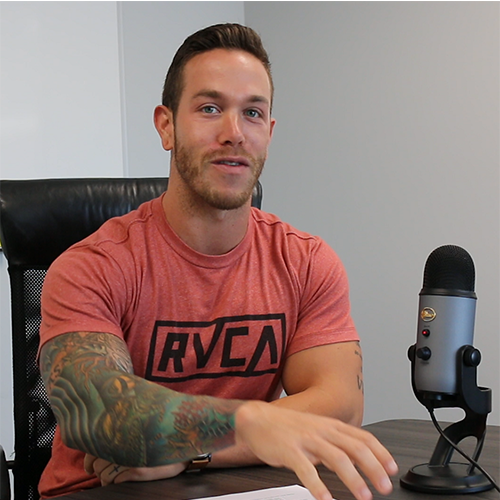
Thursday Aug 09, 2018
#8 3 Steps to Establishing Yourself as a Leader
Thursday Aug 09, 2018
Thursday Aug 09, 2018
Far before you can call yourself an entrepreneur or a leader, you have to take the time to learn what that really looks like.
This episode outlines practical steps you can take to level up your confidence and competence to establish yourself as a leader in your organization.

